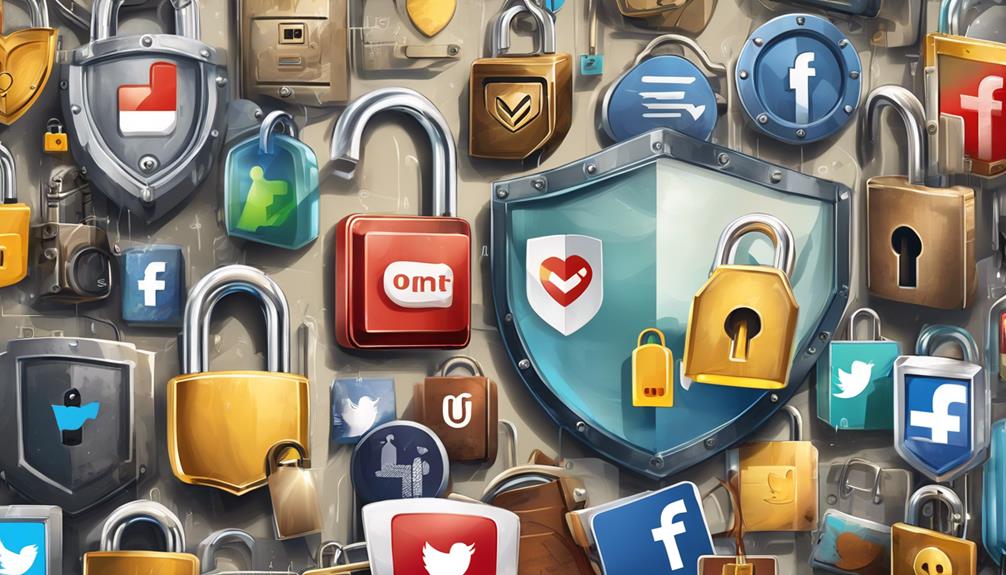Nearly 60% of teens have encountered strangers on social media. This statistic is both concerning and revealing. In today's digital era, oversharing is commonplace. Consequently, it's crucial for youth to grasp the consequences of their online actions. They share not only with friends but also risk privacy invasions. Moreover, they expose themselves to identity theft and unwelcome contacts. Tightening social media privacy is not about instilling fear. Instead, it empowers teens with essential web safety and responsibility tools. They must weigh their social needs against security necessities. Thus, the real issue is not only why but how privacy adjustments safeguard their future. Importantly, we must question the level of risk awareness among adolescents and their proactive measures.
Understanding Privacy Risks

Understanding Privacy Risks
Teens often overlook the privacy risks of online social media activities. They desire connections and belonging, yet fail to see the dangers. Their digital footprints can unexpectedly lead to cyberbullying and data mining threats. The severity of these risks should not be underestimated.
Cyberbullying can cause deep emotional wounds. In extreme cases, it can even drive teens to self-harm or suicide. It's essential for them to realize that shared online content can be harmful. Posts, comments, and photos can easily become tools for bullies. Consequently, the internet transforms into a battlefield instead of a safe haven.
Conversely, data mining is a silent but widespread hazard. Companies meticulously gather social media data to create detailed profiles. These profiles mirror teens' behaviors, choices, and private thoughts. Such information can be misused for targeted ads or, more alarmingly, sold without consent. This breaches not only privacy but also security.
Awareness of these risks is crucial for teens. By implementing robust privacy settings and sharing selectively, they can safeguard themselves. Moreover, they can preserve the online community they value.
Preventing Identity Theft
Adolescents must be vigilant to prevent identity theft, especially on social media. As online fraud escalates, understanding secure passwords is essential. These passwords serve as a primary defense against cyber predators. Teens need to create complex, unique passwords, avoiding obvious combinations such as birthdays.
Moreover, teens should explore their privacy settings thoroughly. By doing so, they can prevent sharing sensitive data with strangers or deceptive scammers. Consequently, they should review these settings frequently. Social media platforms often change their privacy policies unexpectedly.
Protecting one's identity extends beyond social integration or maintaining connections. Identity theft's impact is profound, potentially harming credit scores and personal reputations. Therefore, it's crucial for adolescents to safeguard their personal information proactively.
Avoiding Online Predators

Securing personal information is essential. Additionally, adolescents must stay alert to online predators' tactics. The 'stranger danger' concept is not new. However, the digital era has increased its importance. Predators often hide behind friendly profiles. They aim to join teens' trusted circles subtly.
Teens may ignore signs of a predator while seeking community. They must realize anyone can fake an identity online. Consequently, strict safety settings are imperative. These settings serve as a digital shield. They limit who can see profiles, posts, and personal data.
Educating adolescents on signs of predatory behavior is crucial. Watch for overly personal questions or requests for private chats. Be wary of offers that appear unrealistically favorable. Adolescents should not feel obliged to divulge information. Nor should they meet someone solely known online.
Friends and communities offer a sense of inclusion. Nevertheless, it's vital to cultivate these bonds within privacy control confines. Teens should be cautious and question new online friendships. They must acknowledge that their safety is paramount. Online safety is a collective duty. It starts with wise decisions about digital-life entrants.
Managing Digital Reputation
Frequently overlooked, the management of one's digital reputation is a critical aspect of online privacy that demands rigorous attention and care. As teens navigate the complex world of social media, they must recognize that their digital footprint can have long-lasting implications. It's not just about staying safe; it's about shaping how they're perceived now and in the future.
To maintain a positive online presence, teens can engage in profile pruning and use friendship filters to curate their digital image. Here's how they can take control:
- Profile Pruning
- Remove outdated or inappropriate posts
- Regularly update privacy settings
- Friendship Filters
- Evaluate connections for trustworthiness
- Limit profile visibility to genuine friends
By regularly pruning their profiles, teens can eliminate content that doesn't align with the personal brand they wish to project. They're not just cleaning up; they're actively constructing their online identity.
Implementing friendship filters allows teens to create a trusted circle, minimizing the risk of personal information falling into the wrong hands. It's not about exclusion; it's about fostering a safe community where they belong.
Teens must stay informed and cautious, ensuring their digital reputation opens doors rather than closing them. This proactive approach empowers teens to take charge of their online narrative, keeping it as authentic and secure as possible.
Safeguarding Personal Information

Safeguarding personal information on social media is crucial for teens. They must diligently protect their privacy and security online. In our interconnected world, cyber etiquette goes beyond manners. It's about keeping a private life separate from the risks of oversharing data.
Teens often seek belonging on these platforms. However, they must not compromise their safety for social acceptance. It's essential to educate young users about the dangers of sharing too much. For instance, personal details like home addresses or vacation plans could be harmful if shared.
Sensitive photos can also end up in the wrong hands, possibly leading to unwanted contact or identity theft. By sharing less and tweaking privacy settings, teens can foster a safer digital space. Furthermore, peers should promote self-restraint and respect for digital boundaries.
Navigating the online social landscape, teens must remember their digital footprint is enduring. Consequently, they should ponder the future effects of their online actions. Their personal information is indeed a valuable asset, necessitating continuous vigilant protection.
Frequently Asked Questions
How Can Teens Balance the Desire for Popularity and Social Interaction on Social Media With the Need for Privacy?
Teens enhance their digital literacy to balance social interaction with privacy. Consequently, they withstand peer pressure. Additionally, they share information judiciously. This approach fosters a sense of community. Nonetheless, they do so without sacrificing safety. Essentially, it's about navigating the virtual crowd with intelligence.
What Role Should Parents Play in Their Teenager's Social Media Privacy Settings and Monitoring?
Guidance from parents can enhance teens' safety. Indeed, parental input in privacy settings fosters a secure online space. It merges educational aspects of privacy with the feeling of inclusion in the digital realm.
How Can Teens Recover From a Social Media Privacy Mistake That Has Already Been Made?
She needs to act fast, initiating damage control by removing the problematic content. Additionally, using reputation management tools is crucial. Importantly, to preserve her friendships, she must show she has learned from the error and is working to regain trust.
Are There Any Positive Outcomes From Having a Less Private Social Media Presence as a Teenager?
A teen's open social profile can serve as a beacon, attracting opportunities in the digital realm. It provides chances for online branding and networking. However, they must proceed with informed caution. This is essential to guarantee a safe journey through these virtual waters.
How Do Cultural Differences Impact Teenagers' Views on Social Media Privacy, and How Should They Navigate This?
Cultural norms profoundly influence teenagers' views on social media privacy. Consequently, they must tread cautiously. This balance ensures belonging and safeguards their digital footprint.
Conclusion
In the digital realm, personal details are akin to currency. Consequently, teens need to safeguard their online profiles. Identity theft and predators are omnipresent threats. Moreover, potential damage to one's reputation is a constant risk.
Teens must navigate social media cautiously, much like Odysseus did. They evade virtual Sirens and Cyclopes with careful attention. By using privacy settings, they effectively protect themselves. Indeed, these precautions act as their protective barriers.
It is essential for teens to be proactive guardians. They must defend their digital footprint with vigilance. Ultimately, this ensures the preservation of their integrity. As they forge their future paths, maintaining privacy is key.



